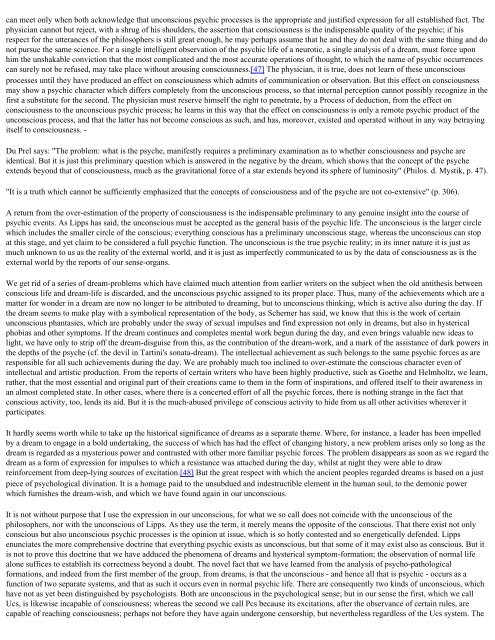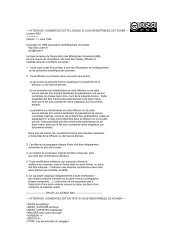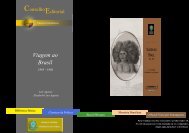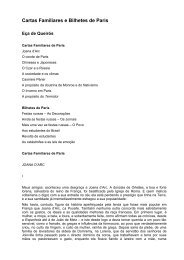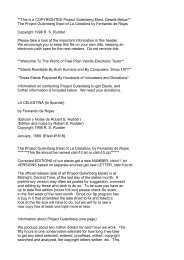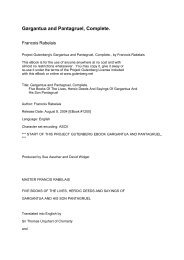The Interpretation of Dreams Sigmund Freud (1900)
The Interpretation of Dreams Sigmund Freud (1900)
The Interpretation of Dreams Sigmund Freud (1900)
Create successful ePaper yourself
Turn your PDF publications into a flip-book with our unique Google optimized e-Paper software.
can meet only when both acknowledge that unconscious psychic processes is the appropriate and justified expression for all established fact. <strong>The</strong><br />
physician cannot but reject, with a shrug <strong>of</strong> his shoulders, the assertion that consciousness is the indispensable quality <strong>of</strong> the psychic; if his<br />
respect for the utterances <strong>of</strong> the philosophers is still great enough, he may perhaps assume that he and they do not deal with the same thing and do<br />
not pursue the same science. For a single intelligent observation <strong>of</strong> the psychic life <strong>of</strong> a neurotic, a single analysis <strong>of</strong> a dream, must force upon<br />
him the unshakable conviction that the most complicated and the most accurate operations <strong>of</strong> thought, to which the name <strong>of</strong> psychic occurrences<br />
can surely not be refused, may take place without arousing consciousness.[47] <strong>The</strong> physician, it is true, does not learn <strong>of</strong> these unconscious<br />
processes until they have produced an effect on consciousness which admits <strong>of</strong> communication or observation. But this effect on consciousness<br />
may show a psychic character which differs completely from the unconscious process, so that internal perception cannot possibly recognize in the<br />
first a substitute for the second. <strong>The</strong> physician must reserve himself the right to penetrate, by a Process <strong>of</strong> deduction, from the effect on<br />
consciousness to the unconscious psychic process; he learns in this way that the effect on consciousness is only a remote psychic product <strong>of</strong> the<br />
unconscious process, and that the latter has not become conscious as such, and has, moreover, existed and operated without in any way betraying<br />
itself to consciousness. -<br />
Du Prel says: "<strong>The</strong> problem: what is the psyche, manifestly requires a preliminary examination as to whether consciousness and psyche are<br />
identical. But it is just this preliminary question which is answered in the negative by the dream, which shows that the concept <strong>of</strong> the psyche<br />
extends beyond that <strong>of</strong> consciousness, much as the gravitational force <strong>of</strong> a star extends beyond its sphere <strong>of</strong> luminosity" (Philos. d. Mystik, p. 47).<br />
"It is a truth which cannot be sufficiently emphasized that the concepts <strong>of</strong> consciousness and <strong>of</strong> the psyche are not co-extensive" (p. 306).<br />
A return from the over-estimation <strong>of</strong> the property <strong>of</strong> consciousness is the indispensable preliminary to any genuine insight into the course <strong>of</strong><br />
psychic events. As Lipps has said, the unconscious must be accepted as the general basis <strong>of</strong> the psychic life. <strong>The</strong> unconscious is the larger circle<br />
which includes the smaller circle <strong>of</strong> the conscious; everything conscious has a preliminary unconscious stage, whereas the unconscious can stop<br />
at this stage, and yet claim to be considered a full psychic function. <strong>The</strong> unconscious is the true psychic reality; in its inner nature it is just as<br />
much unknown to us as the reality <strong>of</strong> the external world, and it is just as imperfectly communicated to us by the data <strong>of</strong> consciousness as is the<br />
external world by the reports <strong>of</strong> our sense-organs.<br />
We get rid <strong>of</strong> a series <strong>of</strong> dream-problems which have claimed much attention from earlier writers on the subject when the old antithesis between<br />
conscious life and dream-life is discarded, and the unconscious psychic assigned to its proper place. Thus, many <strong>of</strong> the achievements which are a<br />
matter for wonder in a dream are now no longer to be attributed to dreaming, but to unconscious thinking, which is active also during the day. If<br />
the dream seems to make play with a symbolical representation <strong>of</strong> the body, as Scherner has said, we know that this is the work <strong>of</strong> certain<br />
unconscious phantasies, which are probably under the sway <strong>of</strong> sexual impulses and find expression not only in dreams, but also in hysterical<br />
phobias and other symptoms. If the dream continues and completes mental work begun during the day, and even brings valuable new ideas to<br />
light, we have only to strip <strong>of</strong>f the dream-disguise from this, as the contribution <strong>of</strong> the dream-work, and a mark <strong>of</strong> the assistance <strong>of</strong> dark powers in<br />
the depths <strong>of</strong> the psyche (cf. the devil in Tartini's sonata-dream). <strong>The</strong> intellectual achievement as such belongs to the same psychic forces as are<br />
responsible for all such achievements during the day. We are probably much too inclined to over-estimate the conscious character even <strong>of</strong><br />
intellectual and artistic production. From the reports <strong>of</strong> certain writers who have been highly productive, such as Goethe and Helmholtz, we learn,<br />
rather, that the most essential and original part <strong>of</strong> their creations came to them in the form <strong>of</strong> inspirations, and <strong>of</strong>fered itself to their awareness in<br />
an almost completed state. In other cases, where there is a concerted effort <strong>of</strong> all the psychic forces, there is nothing strange in the fact that<br />
conscious activity, too, lends its aid. But it is the much-abused privilege <strong>of</strong> conscious activity to hide from us all other activities wherever it<br />
participates.<br />
It hardly seems worth while to take up the historical significance <strong>of</strong> dreams as a separate theme. Where, for instance, a leader has been impelled<br />
by a dream to engage in a bold undertaking, the success <strong>of</strong> which has had the effect <strong>of</strong> changing history, a new problem arises only so long as the<br />
dream is regarded as a mysterious power and contrasted with other more familiar psychic forces. <strong>The</strong> problem disappears as soon as we regard the<br />
dream as a form <strong>of</strong> expression for impulses to which a resistance was attached during the day, whilst at night they were able to draw<br />
reinforcement from deep-lying sources <strong>of</strong> excitation.[48] But the great respect with which the ancient peoples regarded dreams is based on a just<br />
piece <strong>of</strong> psychological divination. It is a homage paid to the unsubdued and indestructible element in the human soul, to the demonic power<br />
which furnishes the dream-wish, and which we have found again in our unconscious.<br />
It is not without purpose that I use the expression in our unconscious, for what we so call does not coincide with the unconscious <strong>of</strong> the<br />
philosophers, nor with the unconscious <strong>of</strong> Lipps. As they use the term, it merely means the opposite <strong>of</strong> the conscious. That there exist not only<br />
conscious but also unconscious psychic processes is the opinion at issue, which is so hotly contested and so energetically defended. Lipps<br />
enunciates the more comprehensive doctrine that everything psychic exists as unconscious, but that some <strong>of</strong> it may exist also as conscious. But it<br />
is not to prove this doctrine that we have adduced the phenomena <strong>of</strong> dreams and hysterical symptom-formation; the observation <strong>of</strong> normal life<br />
alone suffices to establish its correctness beyond a doubt. <strong>The</strong> novel fact that we have learned from the analysis <strong>of</strong> psycho-pathological<br />
formations, and indeed from the first member <strong>of</strong> the group, from dreams, is that the unconscious - and hence all that is psychic - occurs as a<br />
function <strong>of</strong> two separate systems, and that as such it occurs even in normal psychic life. <strong>The</strong>re are consequently two kinds <strong>of</strong> unconscious, which<br />
have not as yet been distinguished by psychologists. Both are unconscious in the psychological sense; but in our sense the first, which we call<br />
Ucs, is likewise incapable <strong>of</strong> consciousness; whereas the second we call Pcs because its excitations, after the observance <strong>of</strong> certain rules, are<br />
capable <strong>of</strong> reaching consciousness; perhaps not before they have again undergone censorship, but nevertheless regardless <strong>of</strong> the Ucs system. <strong>The</strong>


